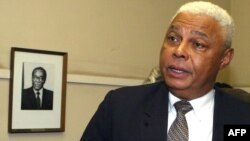HARARE — The outgoing U.S. ambassador to Zimbabwe, Charles Ray, says he fears the African nation's next elections could be violent, judging by recent trends.
Speaking at his last media briefing in Harare, retiring U.S. Ambassador Charles Ray said elections in Zimbabwe might turn violent, “There are disturbing signs of potential of violence," he stated. "That could be problematic in an election environment.”
Since 2000, when President Robert Mugabe’s ZANU-PF party felt the challenge of a strong opposition, Zimbabwean elections have been violent. That resulted in the United States, Britain and other Western countries imposing sanctions on Mugabe and his party leadership, beginning in 2002.
The army, which has openly said it supports ZANU-PF, has been accused of fanning violence.
“I spent 20 years of life as a professional soldier," said Ray. "The role of the army is to defend the nation. In order to do that you need to develop a degree of professionalism. While it does not mean that military people are not entitled to have political views, it means that military people, in order to remain professional and in service to the country, they must delink their personal political convictions from their current professional duties.”
The ambassador said Washington would lift sanctions imposed on Mugabe and his allies if it saw human rights being honored, and an election reflecting Zimbabwean wishes had been held.
The European Union made a similar statement Monday, saying it will remove targeted sanctions after Zimbabwe holds "peaceful and credible" elections.
Zimbabwe is set to hold elections by June 2013 to end the power-sharing government of Mugabe and Prime Minister Morgan Tsvangirai. The two formed a coalition in 2009, after regional leaders nullified a violent election in which Mugabe claimed victory over Tsvangirai.
Speaking at his last media briefing in Harare, retiring U.S. Ambassador Charles Ray said elections in Zimbabwe might turn violent, “There are disturbing signs of potential of violence," he stated. "That could be problematic in an election environment.”
Since 2000, when President Robert Mugabe’s ZANU-PF party felt the challenge of a strong opposition, Zimbabwean elections have been violent. That resulted in the United States, Britain and other Western countries imposing sanctions on Mugabe and his party leadership, beginning in 2002.
The army, which has openly said it supports ZANU-PF, has been accused of fanning violence.
“I spent 20 years of life as a professional soldier," said Ray. "The role of the army is to defend the nation. In order to do that you need to develop a degree of professionalism. While it does not mean that military people are not entitled to have political views, it means that military people, in order to remain professional and in service to the country, they must delink their personal political convictions from their current professional duties.”
The ambassador said Washington would lift sanctions imposed on Mugabe and his allies if it saw human rights being honored, and an election reflecting Zimbabwean wishes had been held.
The European Union made a similar statement Monday, saying it will remove targeted sanctions after Zimbabwe holds "peaceful and credible" elections.
Zimbabwe is set to hold elections by June 2013 to end the power-sharing government of Mugabe and Prime Minister Morgan Tsvangirai. The two formed a coalition in 2009, after regional leaders nullified a violent election in which Mugabe claimed victory over Tsvangirai.




